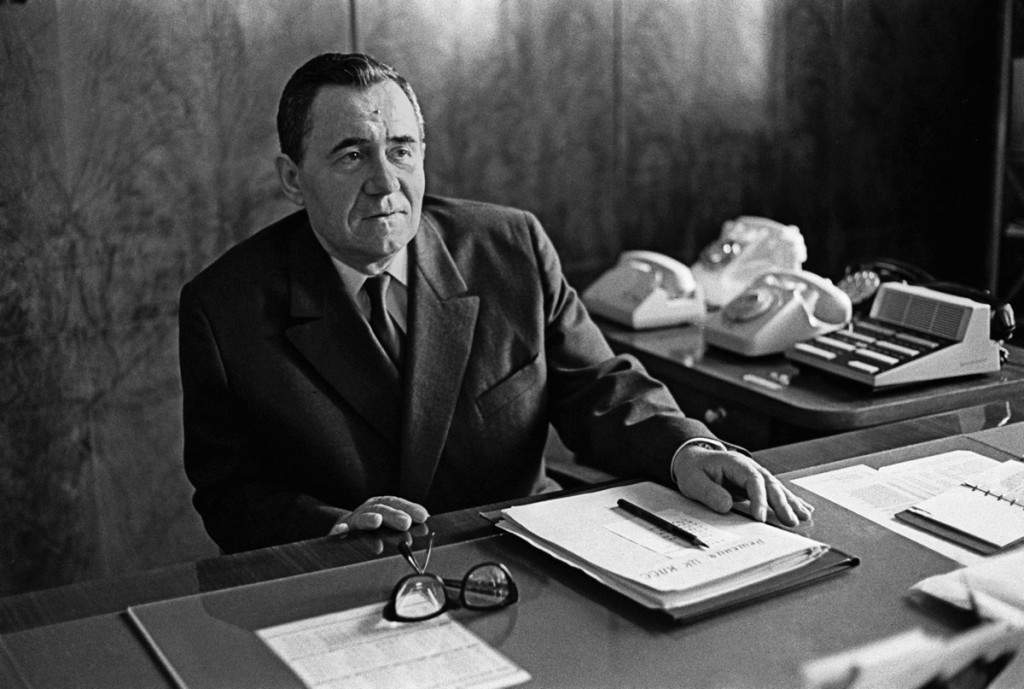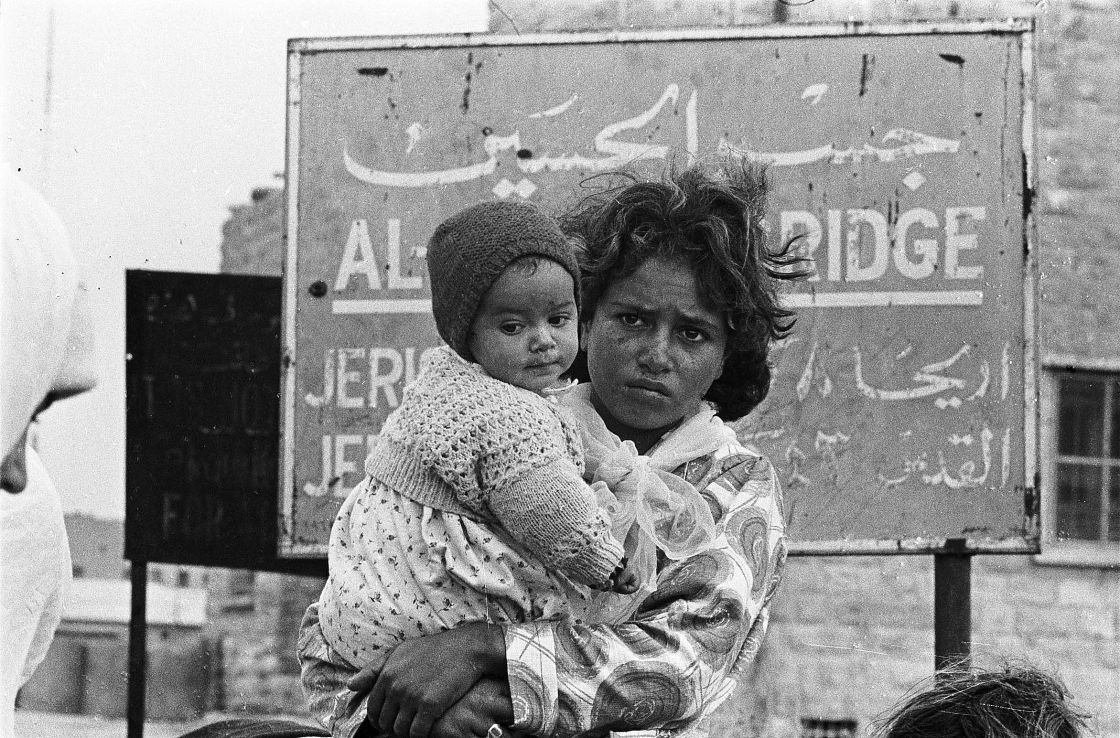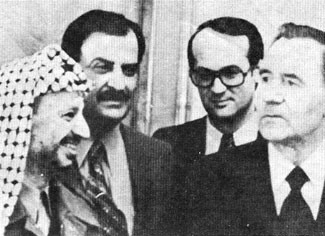- Articles
- Posted
A First Step to Consider: How the History of the USSR is Distorted with Regard to Palestine and Why?
The falsification of history has always been part of the battle of the present and the future, because the way in which people understand their past, and the past of their peoples and their world is critical in shaping their attitudes, positions, and alignments with regards to the various forces and the various current conflicts taking place among them, around them, and the conflicts imposed on them.
Before the last review of this piece in preparation for sending it to Kassioun’s editorial board, I saw a headline about the same topic that I am dealing with here. This headline, ironically, appeared on British media outlet BBC Arabic about a book titled “Moscow-Tel Aviv: Documents and Secrets” by an Egyptian author named Sami Emara, and the BBC story title was: “Israel and the Soviets: Without Stalin, Israel would not have been established”. (Interestingly, yet not surprisingly, the story only appeared in BBC Arabic.)
Clarifications
This piece is only the first one in a series we are working on, dealing with the same topic, based on historical data and documents. Although we were working to produce the research that we are conducting so that it appears in the form of an integrated study, whatever its size, what prompted us to start publishing some of what we have already found in our research is that there are some who are pushing the subject more and more into the spotlight, spreading old and new venoms of lies and fabrication for objectives, some of which we will clarify hereinafter. The undertaking of this article will be limited to responding to lies contained in an article attributed to a Russian writer named Nadezhda Madzalevskaya, published last month, entitled “What Jews Owe Stalin”, and was translated into Arabic by Iraqi translator, Adel Haba.
A Necessary Quote
“Many things related to our party and our people will be vilified and we will be mistreated, above all in foreign countries, and even in our own country. Zionism, in its destructive frenzy for global supremacy, will be harsh on us, criticizing us for our successes and achievements. They still view Russia as a barbarian country, as a supplement of raw materials. My own name will also be slandered. It is already being slandered right now. They will attribute many crimes to me.
Global Zionism will try, with all means, to destroy our union, so that Russia cannot rise again. The strength of the Soviet Union lies in the friendship of peoples. The sharp blade of conflicts will be directed, first and foremost, towards the destruction of this friendship, to cut off Russia from its surroundings”.
This quote is part of a documented dialogue in which Stalin spoke in November 1939, which can be found in this article (in Arabic) which has the full text of his dialogue with Alexandra Kollontai, including the above quote.
What are the Goals?
Before embarking on browsing some of the UN documents on the Palestinian issue, which exceed one hundred thousand (100,000) documents, it is useful to present what we believe are political goals behind the current intensification of attempts to link the Soviet Union with the establishment of the “Israeli” entity.
- “Israel”, apart from the celebrations of the Deal of the Century and normalization agreements, and within the direct reality of its latest defeat, knows unquestionably that it is about to be orphaned. More clearly, the decline of the US’s weight internationally, and the decline of the West’s weight in general, will directly mean a decline in the weight and ability of the Zionist entity to continue. Therefore, it is not surprising that some within the entity have dreams and illusions of searching for a new guardian, especially since this entity has had the experience of moving from being Britain’s child to being the US’s.
Distorting history in this sense, aims to camouflage the nature of the entity as a project that is not only racist, settler-based, and colonial, but even covering up its being an essential part of the global Western project, and covering up the long history of hostility between the Soviet Union (and Russia implicitly) and the entity. This is the hostility that appeared in various periods of history, including the position of Stalin himself, especially towards Trotsky and the Jewish Bund group.
Likewise, the Bulganin warning that stopped the tripartite aggression against Egypt, including also Soviet officers who were killed in the direct battle with the Zionist in the October 1973 War, not to mention that all the weapons that “Israel” fought with are American and Western weapons. Additionally, all the arms used to fight “Israel” for many decades were Soviet weapons. This is a long history of enmity and, indeed, it requires great efforts to cover it up and distort it.
- The illusion of moving to the guardianship of Russia with Western retreat is not the primary goal of the ongoing distortion processes, because Zionism itself knows that the task of this transition is nearly impossible. Nevertheless, presenting an image of the entity as not only the project of the West, but a project of the East as well, would (or the entity thinks would) create an illusion that it will not retreat with the retreat of the Western project, but rather will remain standing and adapt to the new circumstance. This is something that the entity uses in its internal propaganda these days, in an attempt to minimize the damages. The entity, along with normalizing Arab regimes alike, also use it externally in order to support their choice to normalize and try to reduce its movement in a direction opposite to the actual historical trend.
- If the two previous reasons for the distortion process are related to “Israel” as one of the global Zionism projects, then the deeper reason is related to Zionism itself as one of the main centers of global capitalism, and not just one of its projects. What we clearly mean here is that the ongoing process of changing international balance of power is not just a switch between rising and descending powers, and it is not a process of exchanging chairs. The change that we are seeing on the surface now is an initial reflection of a deep structural crisis of the capitalist system itself; based on a similar and less profound crisis, the October Revolution took place and the Soviet Union emerged, the Union that triumphed and progressed – specifically – under the banner of both Lenin and Stalin. In this sense, there is an imminent danger from the capitalist point of view, and in light of the current crisis, of the possibility of a new radical revolution in Russia in particular or in China or anywhere else in the world. However, the important thing is that any new socialist revolution, in order to succeed, must start from the highest point the previous revolution had reached. That point is exactly at the stage of the great victory over Nazism, that is, during Stalin’s era.
- Attempts to distort the history of the Soviet Union in the eyes of the peoples of the “Third World” are ultimately part of the current international conflict, where fabricated lies about the Soviet Union are attributed to contemporary Russia. At the same time, there is a great amount of ridiculousness when the great history of the Soviet Union is evoked regarding its standing by the peoples of the Third World, whether in obtaining their independence from the West or thereafter by developing them industrially and militarily with major projects, dams, and so on. The ridiculousness stems from saying: “Yes, it was good, but that was the Soviet Union, not present-day Russia.” Therefore, the crooked logic is like this: When there is talk about “bad things” in the history of the Soviet Union and they are mostly fabricated, it is said, “this is the history of Russia”, and when there is talk about positive things about the Soviet Union, it is said: “forget it, this is a country that no longer exists and has nothing to do with present-day Russia”.
One or Two States?
After this long introduction (which can be considered a prelude to the upcoming series of pieces and not only to this one), we return to Madzalevskaya’s article.
The article – as evident from its title – revolves around the attempt to invent a lie and prove it, and the lie is that the main credit for the establishment of the “Israeli” entity should be given to Stalin himself.
Since the lie is big, very big, the author begins by acknowledging the British and American role, the Balfour Declaration, and so on, but then seeks to downplay the importance of these two roles and thus paves the way for the lie.
Thereafter, the author aims to support the lie by referencing partial sentences made by the USSR’s representative to the UN at the time, Andrei Gromyko, in which he spoke about the suffering of the Jewish people at the hands of the Nazis. The author then jumps right away to declaring that Stalin personally had approved the division of Palestine and creation of two separate states – Arab and Jewish.
At the outset, it must be recalled that the first project for the partition of Palestine was the one proposed by the Royal (British) Commission in its report in 1937, that is, 10 years before the issuance of UN General Assembly Resolution 181 on November 29, 1947.
Additionally, the British partitioning project was not to divide Palestine into two states, one Arab and another Jewish, but rather into three parts: a state for the Jews, a second part that remains under the British Mandate, and a third that gets annexed to Transjordan. Meaning that the original British partitioning project did not include the establishment of any Arab state within historic Palestine.
The UNGA held many sessions in which the Palestine question was the main agenda point prior to the above-mentioned partitioning November 1947 resolution. One such meeting took place on May 14, 1947, from which we present a large portion of what the USSR’s representative at the time said, because that clarifies well (and not through distorted partial quotes like the ones used in the article before us) an important part of the USSR’s position on the issue:


“An equitable solution can be reached only if sufficient consideration is given to the legitimate interests of both these peoples. All this leads the Soviet delegation to the conclusion that the legitimate interests of both the Jewish and Arab populations of Palestine can be duly safeguarded only through the establishment of an independent, dual, democratic, homogeneous Arab-Jewish State.
Such a State must be based on equality of rights for the Jewish and the Arab populations, which might lay foundations of cooperation between these two peoples to their mutual interest and advantage. It is well known that this plan for the solution of Palestine's future has its supporters in that country itself…
Thus, the solution of the Palestine problem by the establishment of a single Arab-Jewish State with equal rights for the Jews and the Arabs may be considered as one of the possibilities and one of the more noteworthy methods for the solution of this complicated problem. Such a solution of the problem of Palestine’s future might be a sound foundation for the peaceful co-existence and co-operation of the Arab and Jewish populations of Palestine, in the interests of both these peoples and to the advantage of the entire Palestine population and of the peace and security of the Near East.
If this plan proved impossible to implement, … then it would be necessary to consider the second plan which, like the first, has its supporters in Palestine, and which provides for the partition of Palestine into two independent autonomous States, one Jewish and one Arab. I repeat that such a solution of the Palestine problem would be justifiable only if relations between the Jewish and Arab populations of Palestine indeed proved to be so bad that it would be impossible to reconcile them and to ensure the peaceful co-existence of the Arabs and the Jews.”

Thus, based on the above, the USSR’s first choice for the solution was not to partition Palestine into two states, one Arab and one Jewish, but to keep Palestine one country. Furthermore, Gromyko made it very clear that the option of establishing one state, an ethnic one – either Arab or Jewish – with disregard to the “other” group based on their ethnicity was unacceptable and out of the question (this was the British option that we indicated above in the 1937 project).
Gromyko repeated these views in another session on November 26, 1947, a few days prior to passing resolution 181, where he said:

“When the question of the future of Palestine was under discussion at the special session of the General Assembly, the Government of the USSR pointed to the two most acceptable solutions of this question. The first was the creation of a single democratic Arab-Jewish State in which Arabs and Jews would enjoy equal rights. In case that solution were to prove unworkable because of Arab and Jewish insistence that, in view of the deterioration in Arab-Jewish relations, they would be unable to live together, the Government of the USSR through its delegation at the Assembly, pointed to the second solution, which was to partition Palestine into two free, independent and democratic States— an Arab and a Jewish one.”
Regarding Recognition of “Israel”
The second major and frequently repeated lie (or at best, partial truth), and one which the article mentions, is that the USSR was the first country to recognize the new state of “Israel”.
The partial truth is that on May 15, 1948, the day the British Mandate officially ended, the foreign secretary of the “Provisional Government of Israel” sent a telegram to the UN Secretary-General titled “Proclamation of state of Israel”, and on May 17, 1948, the USSR was the first country to recognize “Israel” de jure, the meaning of which we will clarify hereinafter.
However, it is rarely (if ever) mentioned that the United States was the first country to recognize “Israel”, and not de jure, but de facto, 3 days prior to the USSR’s recognition and one day before the actual proclamation of “Israel”. A few other countries joined the US in this de facto recognition, which can also be found in the UN’s archives, but first it is important to explain the importance of the difference between the two types of recognition in the context of international law.
Recognizing “Israel” de facto is a continuation of the same British project, which stipulated the establishments of a state for the Jews, but not a state for the Arabs, that is, this type of recognition is a leap over the partition resolution 181 and a return to the 1937 British project.
On the other hand, the USSR’s recognition of the entity de jure is a commitment to Resolution 181 and a commitment to complete its implementation through the establishment of the Arab state within the existing international balance of powers at the time. The clear objective of rushing to recognize the entity de jure is to place it within the framework of specifically implementing Resolution 181, that is, to place it within the framework that guarantees the establishment of an Arab state.
To be continued…
US Recognition is Documented
The UNGA held a meeting on May 14, 1948, to discuss further the question of the future government of Palestine. The meeting considered several issues related to the question, including a draft resolution that proposed instituting a trusteeship government of Jerusalem. During that meeting the US representative read the following statement issued by the US president:

“This Government has been informed that a Jewish State has been proclaimed in Palestine, and recognition has been requested by the Provisional Government thereof. The United States recognizes the Provisional Government as the de facto authority of the new State of Israel”.



 Reem Issa
Reem Issa
